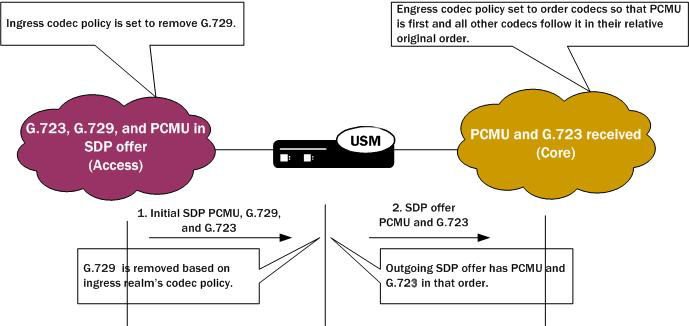Codec Policies for SIP
The Oracle® Enterprise Session Border Controller has the ability to add, strip, and reorder codecs for SIP sessions. This builds on the Oracle® Enterprise Session Border Controller’s pre-existing abilities to route by codec and reorder one codec in an SDP offer by allowing you to configure the order of multiple codecs and to remove specific codecs within the media descriptions in SDP offers.
You can enable the Oracle® Enterprise Session Border Controller to perform these operations on SDP offers by configuring codec policies. Codec policies are sets of rules that specify the manipulations to be performed on SDP offers. They are applied on an ingress and egress basis using the realm and session agent configurations.
Oracle® Enterprise Session Border Controller supports three types of codec policies:
- Ingress policy—Codec policy that the Oracle® Enterprise Session Border Controller applies to the SDP offer for incoming traffic
- Egress policy—Codec policy that the Oracle® Enterprise Session Border Controller applies to the SDP offer for traffic leaving the Oracle® Enterprise Session Border Controller
- Conditional policy—Codec policy that the Oracle® Enterprise Session Border Controller applies to the SDP offer for traffic leaving the Oracle® Enterprise Session Border Controller. A conditional policy differs from an egress policy in providing the capability to perform standard codec manipulations (add and strip) dynamically, based on the codec list and associated parameters contained in the original SDP offer.
The Oracle® Enterprise Session Border Controller applies codec policies during the offer phase of media format negotiation. If codec manipulation is enabled, then the Oracle® Enterprise Session Border Controller performs the modification according to the specific policy and forwards on the traffic.
For example, when the Oracle® Enterprise Session Border Controller receives a SIP INVITE with SDP, it refers to the realm through which the INVITE arrived and performs any manipulations specified by an ingress codec policy that may have been assigned to the ingress realm. With the media description possibly changed according to the ingress codec policy, the Oracle® Enterprise Session Border Controller passes the SDP offer to the outgoing realm so that the an egress codec policy can be applied. Note that the SDP to be evaluated by the egress codec policy may match the original SDP, or it may have been changed during transit through the ingress realm. After applying the egress coded policy, the Oracle® Enterprise Session Border Controller forwards the INVITE.

Since the offer-answer exchange can occur at different stages of SIP messaging, the assigned ingress and egress roles follow the media direction rather than the signaling direction. It might be, for example, that the offer is in an OK that the Oracle® Enterprise Session Border Controller modifies.
You can apply codec policies to realms and to session agents; codec policies configured in session agents take precedence over those applied to realms. However, it is not required that there be both an ingress and an egress policy either for realms or for session agents. If either one is unspecified, then no modifications take place on that side. If neither ingress nor egress policies specified, SDP offers are forwarded as received.



